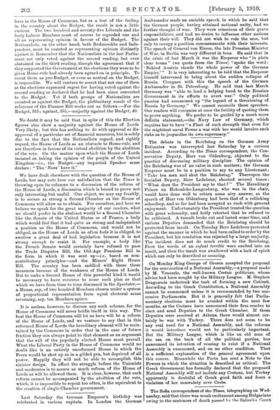Last Saturday. the German Emperor's birthday was celebrated in various
capitals. In London the German
Ambassador made an amiable speech in which he said that the German people, having attained national unity, had no further thought of war. They were conscious of their grave responsibilities, and had no desire to influence other nations against their will. They did not wish to rule the seas, but only to occupy a position. commensurate with their interests. The speech of General von Einem, the late Prussian Minister of War, in Berlin was very different in tone. He said that in the crisis of last March it was the Emperor who "in plain clear terms" (we quote from the Times) "spoke the word : Behind Austria stands the whole power of the German Empire." It is very interesting to be told that the Emperor himself intervened to bring about the sudden collapse of Russia. Compare with this the speech of the German Ambassador in St. Petersburg. He said that last March Germany was "able to lend a helping hand to the Russian Government in its efforts to avert war." Only political passion had summoned up "the legend of a threatening of Russia by Germany." We cannot reconcile these speeches. Our readers will recognise at once the futility of quoting them to prove anything. We prefer to be guided by a much more definite statement, —the Navy Law of Germany, which requires her to have "a Fleet of such strength that even for the mightiest naval Power a war with her would involve such risks as to jeopardise its own supremacy."










































 Previous page
Previous page